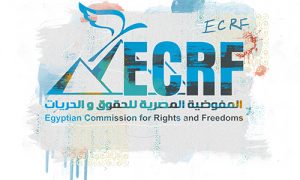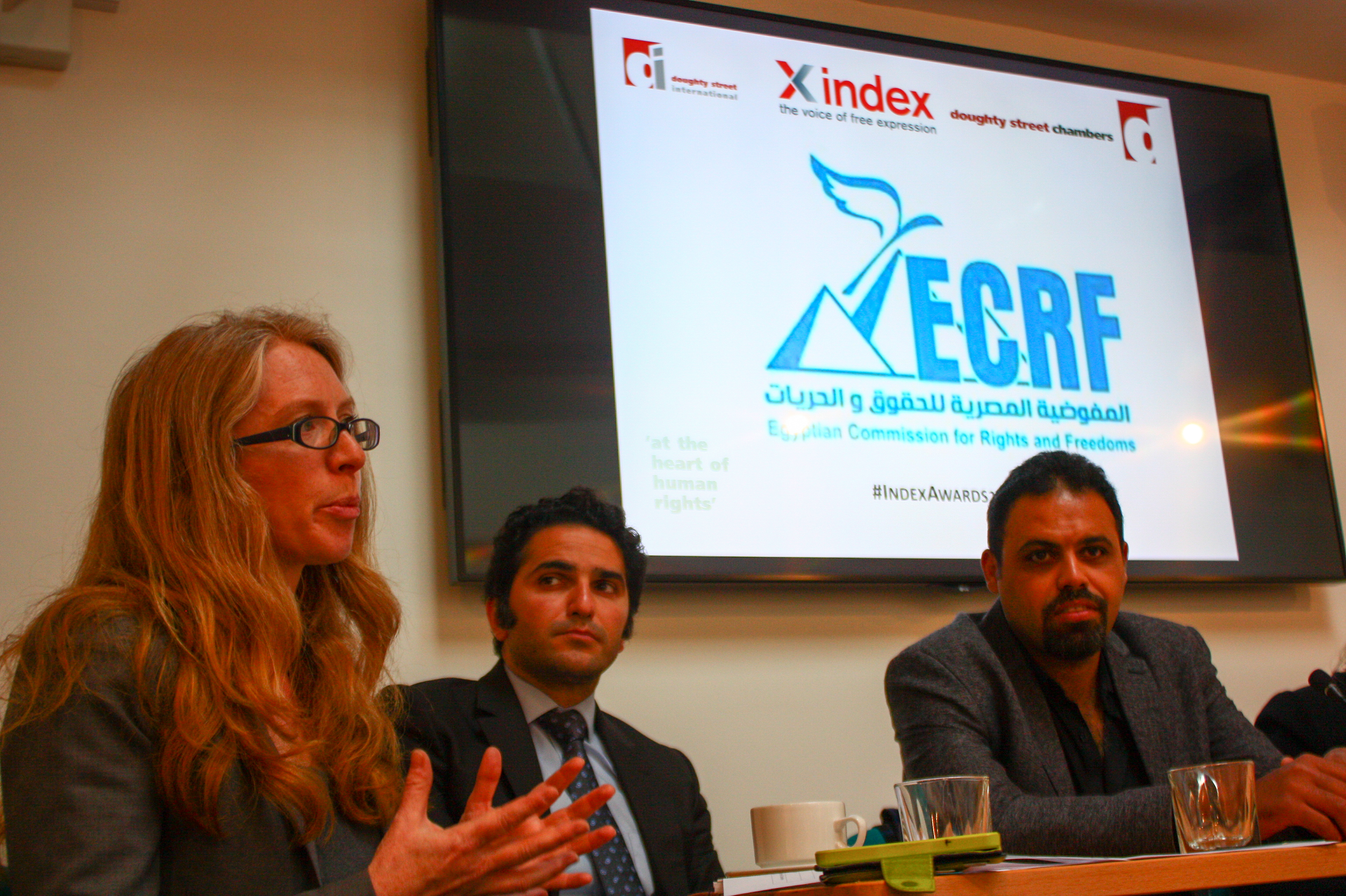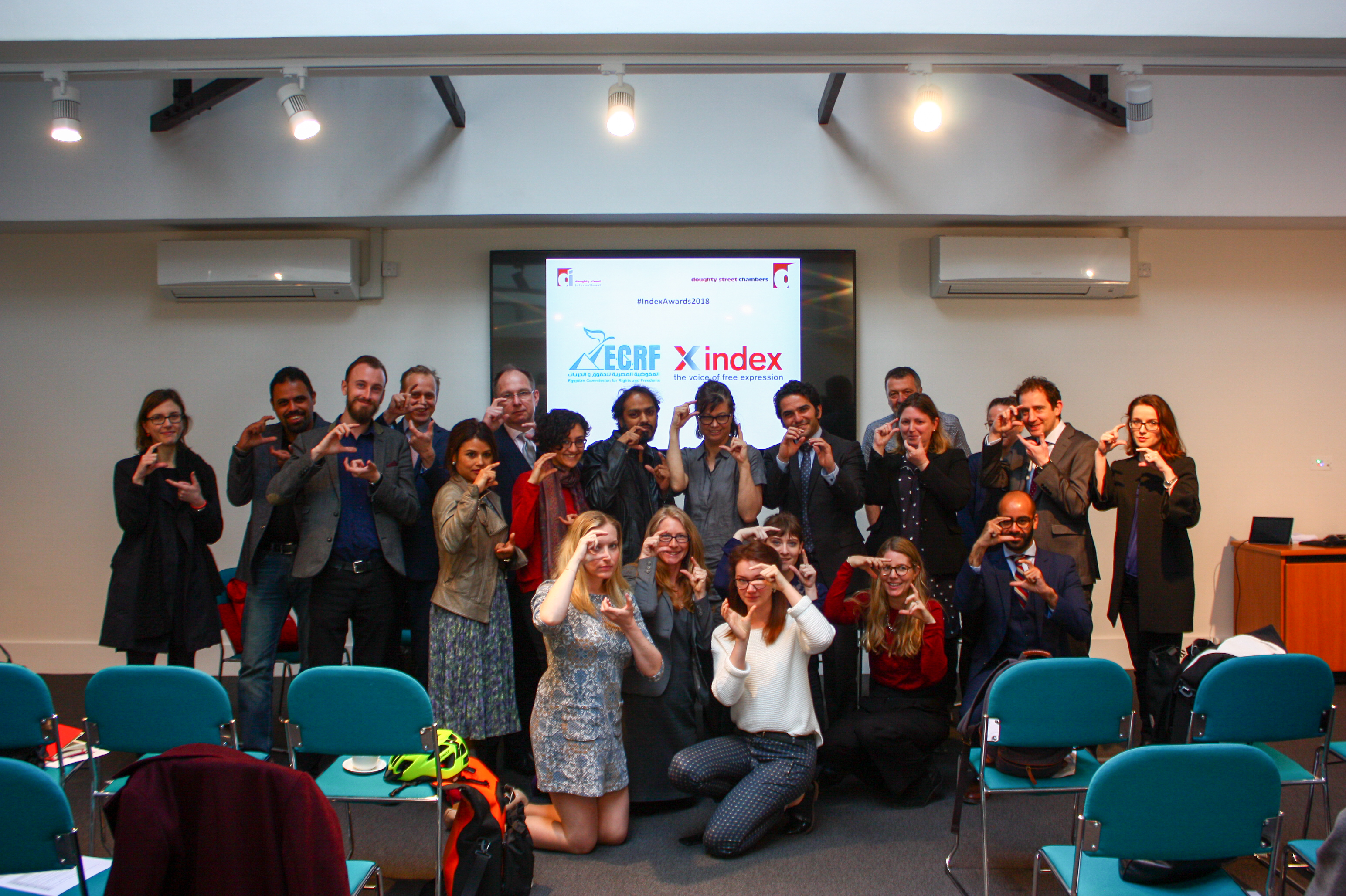11 May 2018 | Campaigns -- Featured, Egypt, Statements
[vc_row][vc_column][vc_column_text]Egyptian security forces have targeted one of the last human rights organisations in the country, the Egyptian Commission for Rights and Freedoms, by detaining executive director Mohamed Lotfy with his wife, Amal Fathy, and their two-year-old-son.
Security officers searched their house, their mobile phones were seized and they were denied the right to communicate with a lawyer or family.
ECRF, a 2018 winner of an Index on Censorship Freedom of Expression award, works on documenting cases concerning torture in prisons and enforced disappearance in an increasingly difficult climate in Egypt where independent voices are suppressed and threatened.
Rachael Jolley, editor of Index on Censorship, said: “It is shocking how the lives of people who are working to make public information about torture in Egyptian prisons and other human rights violations are being threatened. Obviously the intention of this action, and others, is to stop the incredibly brave members of staff at this organisation carrying on with their important work. Index calls on governments around the world to put pressure on Egypt to release Amal Fathy and to shine a spotlight on the Egyptian government’s frightening tactics to stop the public knowing what is going on in that country.”
Authoritarian governments are increasing using arrest, detention or threats to family members to stop human rights activists carrying on with their work.
Lotfy and his son have been released, however his wife Amal Fathy remains in detention. Fathy has been ordered detained for a 15 days by the prosecution.
#الحرية_لأمل_فتحي
#Free_Amal_Fathy
#ECRF[/vc_column_text][/vc_column][/vc_row][vc_row][vc_column][vc_basic_grid post_type=”post” max_items=”12″ style=”load-more” items_per_page=”4″ element_width=”6″ grid_id=”vc_gid:1545211672482-eba4610a-2b33-8″ taxonomies=”24136, 24135″][/vc_column][/vc_row]
23 Apr 2018 | Awards, Digital Freedom
[vc_row][vc_column][vc_video link=”https://youtu.be/ShavP70VY4o”][vc_column_text] The Egyptian Commission for Rights and Freedoms is one of the few human rights organisations still operating in a country which has waged an orchestrated campaign against independent civil society groups. Egypt is becoming increasingly hostile to dissent, but ECRF continues to provide advocacy, legal support and campaign coordination, drawing attention to the many ongoing human rights abuses under the autocratic rule of President Abdel Fattah-el-Sisi. Their work has seen them subject to state harassment, their headquarters have been raided and staff members arrested. ECRF are committed to carrying on with their work regardless of the challenges.[/vc_column_text][/vc_column][/vc_row][vc_row][vc_column][awards_fellows years=”2018″][vc_basic_grid post_type=”post” max_items=”12″ style=”load-more” items_per_page=”4″ element_width=”6″ grid_id=”vc_gid:1524475725322-09fdf4b1-d760-4″ taxonomies=”24136, 24135″][/vc_column][/vc_row]
The Egyptian Commission for Rights and Freedoms is one of the few human rights organisations still operating in a country which has waged an orchestrated campaign against independent civil society groups. Egypt is becoming increasingly hostile to dissent, but ECRF continues to provide advocacy, legal support and campaign coordination, drawing attention to the many ongoing human rights abuses under the autocratic rule of President Abdel Fattah-el-Sisi. Their work has seen them subject to state harassment, their headquarters have been raided and staff members arrested. ECRF are committed to carrying on with their work regardless of the challenges.[/vc_column_text][/vc_column][/vc_row][vc_row][vc_column][awards_fellows years=”2018″][vc_basic_grid post_type=”post” max_items=”12″ style=”load-more” items_per_page=”4″ element_width=”6″ grid_id=”vc_gid:1524475725322-09fdf4b1-d760-4″ taxonomies=”24136, 24135″][/vc_column][/vc_row]
19 Apr 2018 | Awards, Fellowship, Fellowship 2018
[vc_row][vc_column][vc_video link=”https://youtu.be/ShavP70VY4o”][vc_single_image image=”99812″ img_size=”full” add_caption=”yes” alignment=”center”][vc_column_text]The Egyptian Commission for Rights and Freedoms is one of the few human rights organisations still operating in a country which has waged an orchestrated campaign against independent civil society groups. Egypt is becoming increasingly hostile to dissent, but ECRF continues to provide advocacy, legal support and campaign coordination, drawing attention to the many ongoing human rights abuses under the autocratic rule of President Abdel Fattah-el-Sisi. Their work has seen them subject to state harassment, their headquarters have been raided and staff members arrested. ECRF are committed to carrying on with their work regardless of the challenges.
Ladies and Gentlemen, I am honoured being with you this evening, no words can explain my gratitude to Index on Censorship for such an opportunity to speak in front of you and for having this valuable prize on behalf of the Egyptian Commission for Rights and Freedoms. Such international recognition makes us stronger.
No matter how dark is the moment, love and hope are always possible.
And when I speak of love and hope, I have to speak about Hanan Badeldin, the young lady whose husband Khaled Hafez disappeared five years ago, and she persistently kept looking for him all this time through visiting all prisons, asking forcibly disappeared people who reappeared if they saw her husband in any detention facilities they had been to. During one of these visits, almost a year ago, Hanan was arrested and detained on charges of smuggling an illicit item into prison. This illicit item was a paper with the name of her husband and the date of his disappearance, asking to be circulated among prisoners so that anyone who might have seen her husband could give her any information about him
Did Hanan surrender? No, in every renewal of her detention session, she took the photo of her husband with her, raising it in the hope that any other prisoner there might identify where he was.
And when I speak of love and hope, I have to speak about Ibrahim Metwally, whose son Amr disappeared in 2013. Ibrahim kept looking for him for more than four years and Ibrahim is now in jail. Why? Because he formed the association of the families of the forcibly disappeared, and this has been sufficient reason for the authorities to lock him up in solitary confinement in a cell full of garbage for more than a year.
And when I speak of love and hope, I have to speak about Paola Regeni and her son Giulio, an Italian PhD student who lived in Egypt, who disappeared and was killed in Egypt in 2016. For more than two years she has sparked waves of hope and persistence both in Egypt and Italy, speaking each and every time about enforced disappearances in Egypt, speaking out for the truth for Giulio and the disappeared in Egypt.
And when I speak of love and hope, I have to speak about the great lawyers who spend a lot of sleepless nights trying to help victims in Egypt and the wonderful researchers and campaigners who remain the voice of the voiceless victims.
Love and hope were my cell mates when I was kept in solitary confinement at this time almost two years ago in a dark cell where I was deprived of even having a pillow and let me tell you, they were the perfect companions.
Love and hope are our sole weapons against our greatest enemy fear. Together we will conquer it, and it is not an anticipation, it is a promise.
Truth for Giulio Regeni and every Giulio in Egypt.
Ladies and Gentlemen, it’s an honour to be here with you tonight. Thank you so much.
Full profile[/vc_column_text][/vc_column][/vc_row][vc_row disable_element=”yes”][vc_column width=”1/2″][vc_single_image image=”84882″ img_size=”full” alignment=”center”][vc_column_text]
For his one-man protests, Ildar Dadin was sent to prison in December 2015 where he was tortured, before his conviction was quashed in February 2017. Read the full profile.[/vc_column_text][/vc_column][vc_column width=”1/2″][vc_single_image image=”84888″ img_size=”full” alignment=”center”][vc_column_text]
Despite the persecution he faces for his work, Rebel Pepper continues to satirise the Chinese state from a life in exile in Japan. Read the full profile
[/vc_column_text][/vc_column][/vc_row][vc_row disable_element=”yes”][vc_column width=”1/2″][vc_single_image image=”84889″ img_size=”full” alignment=”center”][vc_column_text]
Established in 2015, Turkey Blocks is an independent digital research organisation that monitors internet access restrictions in Turkey. Read the full profile.
[/vc_column_text][/vc_column][vc_column width=”1/2″][vc_single_image image=”84887″ img_size=”full” alignment=”center”][vc_column_text]
Maldives Independent, the Maldives’ premiere English publication and one of the few remaining independent media outlets, was formed in exile in Sri Lanka in 2004. Read the full profile.
[/vc_column_text][/vc_column][/vc_row][vc_row][vc_column][vc_basic_grid post_type=”post” max_items=”12″ style=”load-more” items_per_page=”4″ element_width=”6″ grid_id=”vc_gid:1524235546790-0bd59964-8ec6-6″ taxonomies=”8935″][/vc_column][/vc_row]
18 Apr 2018 | Egypt, News
[vc_row][vc_column][vc_column_text]

Index on Censorship’s CEO Jodie Ginsberg discusses change in Egypt with activists Mohamed Sameh and Ahmad Abdullah (Photo credit: Alessio Perrone)
The opening line of Rousseau’s treatise The Social Contract reads: “Man is born free, and he is everywhere in chains. Those who think themselves masters of others are indeed greater slaves than they.”
This was one of several books to feature in a book club started by Ahmad Abdallah during his four and a half months spent in prison. The co-founder of the Index on Censorship Freedom of Expression Award nominee Egyptian Commission for Rights and Freedoms (ECRF) was arrested without a warrant on 25 April 2016 for alleged terrorist activity.
Awoken by masked members of the special forces prodding him with a machine gun he first thought it was a prank, he recalled at an event discussing human rights in Egypt on 17 April 2018 at Doughty Street Chambers.
The worst of the worst
“I thought it was someone joking, maybe my mum, maybe my father,” he said. “But I got up and then I was afraid for my family. I was pushed by the machine gun once again and my parents were at the side of the door. Then I ask the chief of this group: ‘do you have a warrant for me?’ They showed me nothing, they searched my house and then I was detained.” They said, “what will you do if we don’t have one?”
Index on Censorship CEO Jodie Ginsberg condemned the Egyptian authorities for the misuse of terror legislation to persecute peaceful critics like Abdallah and his colleague Mohamed Sameh.
Speaking to the room, Abdallah told of his continued attempts to challenge repressive ideas and the Egyptian government even while in prison.
He was shocked to be branded a terrorist. “I had nothing to do with these groups. I was jailed with some of our brotherhood and even some of ISIS. I was very afraid at this time. They are the worst of the worst,” he said.
His answer to this fear was books. “I started a book club because I was afraid of the ISIS guys,” he said.
“I was really afraid so I said: ‘OK, why don’t we start a reading club. We have plenty of time, we are in jail! You can bring your books and I can bring my books, maybe we can be more enlightened. I got them books: Rousseau’s Social Contract, literature books, Kafka, philosophy books, Orwell’s 1984 and Animal Farm and as one month elapsed, the ISIS guy was isolated. Everyone was against his ideas and my ideas were spreading amongst other prisoners,” the human rights defender continued.

Attendees of the seminar in group solidarity for Egypt and Shawkan, the persecuted photojournalist #mypicforshawkan (photo credit: Alessio Perrone)
As a result, Abdallah was put in solitary confinement where he was in complete darkness and without food for two days.
“Egyptians are not low rank humans. We need our fundamental rights like everyone else”
Human rights activists and journalists are systematically targeted in Egypt and, like Ahmad Abdallah, called terrorists. Jeremy Dear, representing the International Federation of Journalists at the event, informed attendees 21 journalists have been killed in the country since 2011. More than 20 have been imprisoned, half of which without charge.
Forced disappearances and media harassment
The precise numbers of those targeted are unknown, even to the ECRF. The organisation was set up in 2013 after someone came to Abdallah and Mohamed Lotfy (executive director and co-founder of ECRF) saying his friend had gone missing. This led them to question whether the disappearance was “a single event or a pattern.”
The organisation, nominated for an Index on Censorship Freedom of Expression Award, has since worked on cases involving forced disappearance and the prevention of censorship. The government has made it increasingly difficult for them to conduct their work and their offices were raided twice last year. Their website was also blocked.
The group continues to work towards improved human rights despite the dangers. Ahmad said it is their passion and desire for change that keeps them going. “Egyptians are not low rank humans. We need our fundamental rights like everyone else,” he added.
Sameh continued: “Why do we continue? Much sacrifice has already been done. We really do love Egyptians, we really love humans, we really love our families and we think there is a better way of living, of respecting each other. The reason we keep going is because we think we can change that. I think there is serious hope that we can achieve something. We are showing these people are not left behind, that they are not forgotten.”
Peter Greste, an Al Jhazeera journalist who was imprisoned in Egypt, sent a video message of support Abdallah and Sameh. He told of how in 2014 they had been convicted under terrorist charges. Greste said: “The charges were related to the work we had been doing for Al Jhazeera English… At the time, I struggled to make sense of what they were going through, the gap which was between what they were accused of doing, joining a terrorist group, and what they were actually doing… I couldn’t understand how anyone could draw the conclusions that the prosecution… came to.”
The seminar, “Freedom of Expression and the Protection of Human Rights in Egypt,” concluded hopefully. Ginsberg from Index on Censorship posited several ways those in the room could help. This included a suggestion that media organisations each take a case and closely follow it.
She said: “I know sometimes we think we are sitting here talking and nobody’s paying attention, but actually these kind of public solidarity actions do matter. They matter to the individuals who are in detention and they also matter and bother the authorities.”
Jeremy Dear agreed, emphasising the importance of support from societies with media freedom. He said: “There’s no doubt that in the past few years the space for dissenting and independent voices has shrunk in Egypt. We have a duty to ensure that we are doing everything that we can to create the space for them and help them create their own space to raise their own voices.”[/vc_column_text][/vc_column][/vc_row][vc_row][vc_column][vc_basic_grid post_type=”post” max_items=”4″ style=”load-more” items_per_page=”4″ element_width=”6″ btn_shape=”square” btn_align=”center” grid_id=”vc_gid:1524045621403-609ab883-1e90-3″][/vc_column][/vc_row]

 The Egyptian Commission for Rights and Freedoms is one of the few human rights organisations still operating in a country which has waged an orchestrated campaign against independent civil society groups. Egypt is becoming increasingly hostile to dissent, but ECRF continues to provide advocacy, legal support and campaign coordination, drawing attention to the many ongoing human rights abuses under the autocratic rule of President Abdel Fattah-el-Sisi. Their work has seen them subject to state harassment, their headquarters have been raided and staff members arrested. ECRF are committed to carrying on with their work regardless of the challenges.[/vc_column_text][/vc_column][/vc_row][vc_row][vc_column][awards_fellows years=”2018″][vc_basic_grid post_type=”post” max_items=”12″ style=”load-more” items_per_page=”4″ element_width=”6″ grid_id=”vc_gid:1524475725322-09fdf4b1-d760-4″ taxonomies=”24136, 24135″][/vc_column][/vc_row]
The Egyptian Commission for Rights and Freedoms is one of the few human rights organisations still operating in a country which has waged an orchestrated campaign against independent civil society groups. Egypt is becoming increasingly hostile to dissent, but ECRF continues to provide advocacy, legal support and campaign coordination, drawing attention to the many ongoing human rights abuses under the autocratic rule of President Abdel Fattah-el-Sisi. Their work has seen them subject to state harassment, their headquarters have been raided and staff members arrested. ECRF are committed to carrying on with their work regardless of the challenges.[/vc_column_text][/vc_column][/vc_row][vc_row][vc_column][awards_fellows years=”2018″][vc_basic_grid post_type=”post” max_items=”12″ style=”load-more” items_per_page=”4″ element_width=”6″ grid_id=”vc_gid:1524475725322-09fdf4b1-d760-4″ taxonomies=”24136, 24135″][/vc_column][/vc_row]
